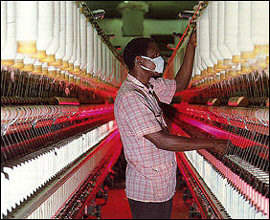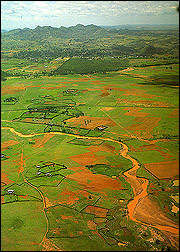 Investing in industry, agriculture and solid minerals Investing in industry, agriculture and solid minerals |
With the help of the United Nations Industrial Development Organisation (UNIDO), the ministry of industries has done a resource endowment survey of all the states. Other activities include providing institutional support for the NIPC as well as comprehensive documentation of the strategic management of industrial development. UNIDO has assisted in capacity building for the ministry and helped improve Nigeria's industrial information database.

The ministry of industries oversees the standards organisation of Nigeria, National Automotive council, Nigeria Industrial Development Bank and the Nigerian Bank for Commerce and Industry. Ministry's industrial profile of Nigeria highlights government's failed ventures in the following sub-sectors: agro-allied, pulp and paper, fertilizer, cement and automotive.
With private sector dominance, small and medium manufacturing industries remain vibrant. The ministry calls for private sector development of the following twelve industrial subsystems: foundries and forges, metal fabrication, phamaceuticals, rubber and plastics, Textiles and wearing products, leather and leather products, sugar, sugar confectioneries and beverages, cereals and grains, vegetable oil, oil seeds, roots, livestock and allied products, cement, ceramics, bricks and glass.
The government supports research and development with a view to raise the local content of domestic manufacturers and to increase the level of capacity utilisation among industrial subgroups. There exists the raw materials research and development council as well as the federal institute of industrial research and the national institute for chemical research.
A science and technology Data Bank, promotion of small and medium enterprises and generous tax reliefs on private sector research and development undertakings are other aspects of government support.
 Agriculture Agriculture

Nigeria requires increased investment in its agriculture to keep pace with the needs of increasing population and urbanisation. Agriculture is to provide raw materials for extensive domestic manufacturing activities while export crops will help diversify the country's forex revenue base.
Nigeria's 36 state governments owe primary responsibility for boosting agricultural output but the federal government sets basic polices and priorities.
The government sees agriculture as the backbone of the economy. Agriculture accounts for 38% of the GDP and engages over 50% of the labour force.
Institutional framework established since the 1970s to boost agriculture included the agricultural development projects with World Bank support. The ADPs have remained the main strategy both for agricultural development and rural tranformation. among the elements are improved supplies of farming inputs (fertilizers and agro-chemicals) and extensive infrastructural improvements (rural roads and water supplies).
The target beneficiaries are the small-scale farmers who control over 75% of domestic production. ADPs have encouraged the introduction of new form. Mr. Nasreddin, MD/CEO of the manufacturing conglomerate Nasco Group, created in 1963 in Jos, deplores the fact that most products are imported. He says "the potential of the agro-business is great and with a good policy, a good sense of direction and with mechanised technology, Nigeria stands a good chance to be self-sufficient and to export its agro based products". |
Government's agricultual policy aims at guaranteeing food self sufficiency, raw materials for industry, export earnings and economic diversification issues the agricultrue ministry is tackling include the need to raise productivity and income among farmers. There is the continuing quest for export markets as well as broad agro-industrial investments to enhance value added in the sector. The country seeks some concessions under the WTO to give its agriculture room to achieve international competitiveness.
The improved macro economic environment which the government has pledged is expected to see increased investment in agriculture by structured business organisations. If Nigeria's rubber is fully hamessed it could generate annual export revenue in excess of US$ 5 billion.
A 1997 study by the UN's food and agriculture organisation called for annual investment of about US$ 1 billion in primary production, rural infrastructure and agro-processing towards achieving annual growth rate of 7.5% for the agricultural sector.
The government says 60% of the required investment is expected to come from the public sector to address needs in rural infrastructure, agricultural research and technology, among others. The private sector will invest in direct commercial agricultural production. The government has set medium and long term output targets in the subsectors of crops, livestock, fisheries and forestry.
Recognising agriculture as essentially a private sector activity, the government says its role will largely be promotional and supportive. In that vein, the government intends to set up a price support mechanism - buyer of last resort - to stimulate and stabilise production.
A World Bank study says government activities have overwhelmingly focused on the direct provision of inputs and services rather than fully supporting private sector provision. This approach has not helped the sector. A new growth strategy will have to rely on competitive trade and exchange rate policies Nigeria's major agricultural crops include yam, cassava, sorghum, millet, maize, rice, groundnut, cotton, cocoa, oil palm, rubber.
The domestic market for agriculture is strong given the large and high-growing food, beverages and cotton textiles industry.
According to World Bank estimates, Nigeria in the late 90s could boast of approximately 650 agro-industrial firms utilizing such inputs as sorghum, cotton, cassava, rubber, maize, oil palm, groundnuts. The outputs have export potentials and include starches, oils, colorings, pharmaceuticals and textiles.
Increased stability of the trade regime will reduce the risk of investing in agriculture or agro-processing.
 Solid Minerals Solid Minerals
Against the previous situation of heavy government involvement in the solid minerals sector, the government is now championing private investment in that sector. Government-owned companies such as the Nigerian Mining Corporation (NMC) the Nigerian Coal Corporation (NCC) are about to be privatised. The new Ministry of Solid Minerals Development, which was created in 1995, commissioned in 1996 Global Minerals Ltd to carry out the Nigerian Minerals Appraisal and Monetization Program (NIMAMOP). The latter consists in making an inventory of mineral occurencies, then selecting the most prospective properties and carrying out additional work with the view to future investment from the private sector.
Of the below listed solid minerals, only 13 are actually being mined, processed and marketed. These 13 are: Coal, kaolin, barytes, limestone, dolomite, feldspar, glass sand, gemstones, gold, iron ore, lead/zinc, tin and gypsum. Besides agricultural land and crude oil, solid minerals rank third among Nigeria's natural resources.
The government maintains a generous incentive package for investors in the solid minerals sector. The government is being urged to privatise its mining companies. It is also advised by the World Bank to combine its promotional efforts with the provision of sundry supportive services particularly a comprehensive database.
The solid minerals sector offers enormous growth potentials if targeted towards the export market. LIST OF NIGERIAN SOLID MINERALS: | 1. Kaolin | 18. Bauxite | | 2. Gypsum | 19. Iron Ore | | 3. Barytes | 20. Lead, Zinc | | 4. Talc | 21. Tin Ore (Primary) | | 5. Limestone and Dolomite | 22. Columbite | | 6. Glass and silica sand | 23. Graphite | | 7. Feldspar | 24. Kyanite and Sillimanite | | 8. Diatomite | 25. Nickel Cobalt | | 9. Trona | 26. Fluorspar | | 10. Coal | 27. Wolframite | | 11. Decorative construction stones | 28. Limente | | 12. Bentonite | 29. Manganese | | 13. Phosphate | 30. Molybdenum | | 14. Salt | 31. Monazite | | 15. Gemstones | 32. Pyrochlore | | 16. Magnesite | 33. Wolframite | | 17. Gold | 34. Zircon |
|

